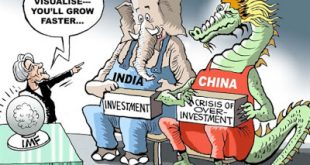The national elections in India have brought victory to the National Democratic Alliance (NDA) coalition, led by the Bharatiya Janata Party (BJP). The NDA has won a stable majority in the lower house of parliament. This means that the right-wing coalition will remain in power for at least another five years, and Prime Minister Narendra Modi will be able to continue his economic and social reforms, as well as be able to operate with a free hand in the international arena. India takes a...
Read More »Banikinkar Pattanayak — Indian Households Hold More Gold Than the World’s Top 10 Central Bank Holders Combined
This is nothing new. India households have always been holders of gold. Chinese households also have a preference for gold.As India and China become more prosperous, this demand will likely increase.Checkpoint AsiaIndian Households Hold More Gold Than the World’s Top 10 Central Bank Holders CombinedBanikinkar Pattanayak
Read More »IPA’s weekly links
Pick up your own 5-HTTLPR gene research summary shirt on etsy.Guest post by Jeff Mosenkis of Innovations for Poverty Action IPA’s looking for a Director of Poverty Measurement. In particular the job involves overseeing the Poverty Probability Index, a short, country-specific tool practitioners use to estimate poverty rates, and developing new non-monetary measures (requires strong quant background). Please share with anybody who might be interested.How the government of Odisha, one of...
Read More »Structural Change in China and India: External Sustainability and the Middle-Income Trap
Shouldn't listen to the IMF anyway New working paper co-authored with Suranjana Nabar-Bhaduri, and published by the Political Economy Research Institute (PERI) from UMass-Amherst. From the abstract:This paper focuses on the different development strategies of China and India, particularly regarding the role of manufacturing and services for long-run productivity growth, external competitiveness and financial fragility. The findings appear to support the argument that productivity...
Read More »IPA’s weekly links
Guest post by Jeff Mosenkis of Innovations for Poverty Action A wonderful back and forth between David Evans and DFID Deputy Chief Economist Nick Lea, ostensibly about regressions, but to me resonated more broadly on methods. Papers seem to have to need the magical pixie dust of a regression to get accepted for publication, but is it the case that every problem in development is a nail waiting for a regression hammer? Lea wonders if methods are constraining the kinds of questions economists...
Read More »John O’Day — When India Tries to Regulate Amazon, US Media Qualms About Monopoly Disappear
Double standard.FAIRWhen India Tries to Regulate Amazon, US Media Qualms About Monopoly Disappear John O'Day
Read More »Gideon Polya — Britain Robbed India Of $45 Trillion & Thence 1.8 Billion Indians Died From Deprivation
Eminent Indian economist Professor Utsa Patnaik (Jawaharlal Nehru University) has estimated that Britain robbed India of $45 trillion between 1765 and 1938, However it is estimated that if India had remained free with 24% of world GDP as in 1700 then its cumulative GDP would have been $232 trillion greater (1700-2003) and $44 trillion greater (1700-1950). Deprivation kills and it is estimated that 1.8 billion Indians died avoidably from egregious deprivation under the British (1757-1947)....
Read More »Kim Jin-hyun — Should We Expect ‘Pax Asiatica’ to Arise?
While the West is divided, with the US and the EU arguing with each other and suffering from internal crises, China and India are becoming world powers. What does it mean globally and locally? Should we expect any Asian country or Asia as a whole to become a new powerhouse? How to preserve security in the region and what Russia’s role in that could be? The world’s balance of power is slowly, but steadily moving towards Asia. While some countries like South Korea and Japan still depend on...
Read More »IPA’s weekly links
The rest of the Jack Ryan pilot is 45 minutes of talking about clustering standard errors David McKenzie has a nice post and discussion on descriptive studies in development. In his back and forth with Lant in the comments he mentions the count of how many development econ studies in 14 journals in 2015 were RCTs (9.7%). Google introduced a data set search, which trawls for publicly available data sets, similarly to how Google Scholar works. Here they describe how it works and how to...
Read More »Sputnik — Ikea Chaos: Opening of First Store in India Causes Stampede, Traffic Jam (VIDEO)
Consumerism.Sputnik InternationalIkea Chaos: Opening of First Store in India Causes Stampede, Traffic Jam (VIDEO)
Read More » Heterodox
Heterodox



